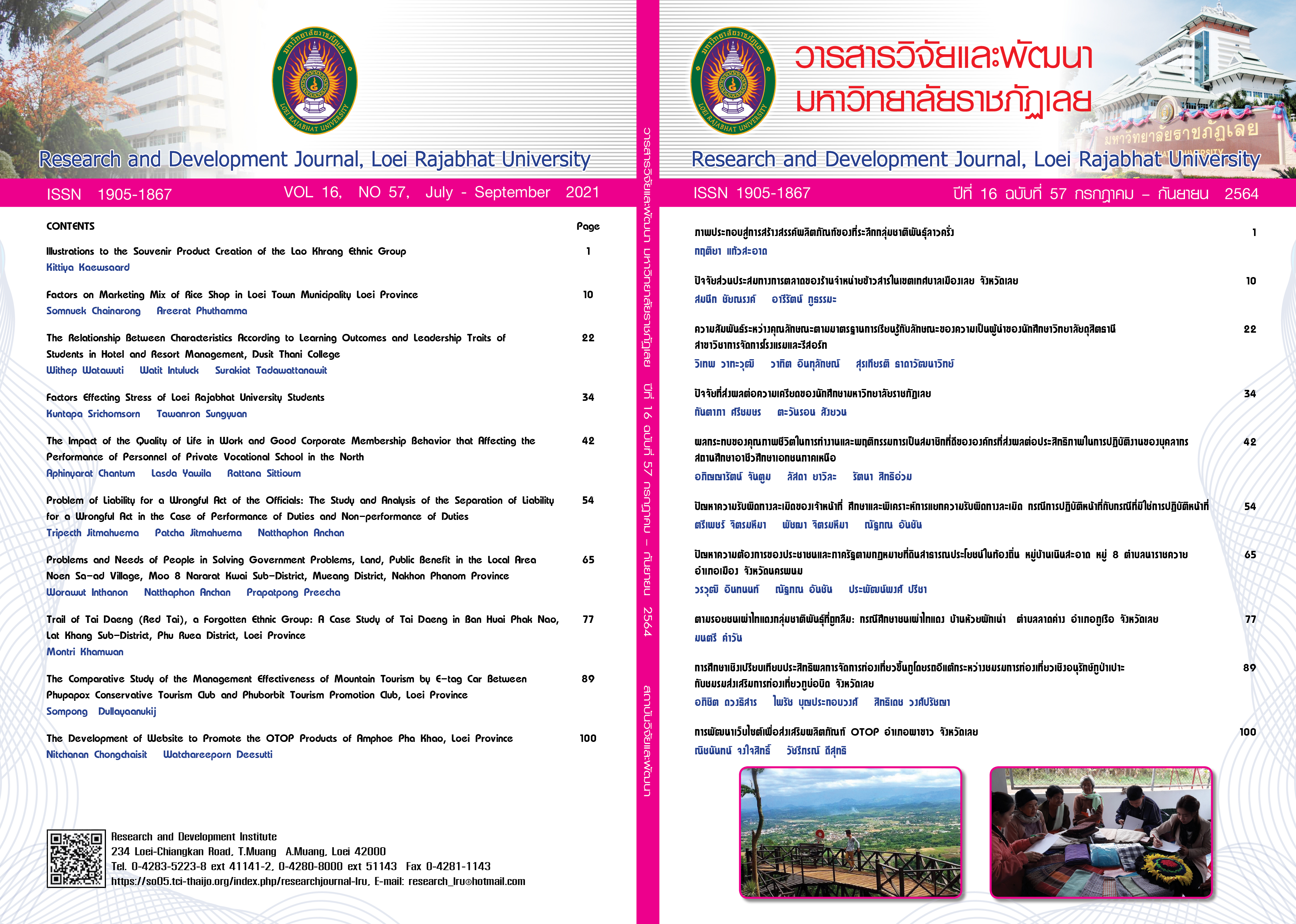ปัญหาความรับผิดทางละเมิดของเจ้าหน้าที่ ศึกษาและพิเคราะห์ การแยกความรับผิดทางละเมิด กรณีการปฏิบัติหน้าที่กับกรณีที่มิใช่การปฏิบัติหน้าที่
คำสำคัญ:
ความรับผิดทางละเมิด, เจ้าหน้าที่ของรัฐ, หน่วยงานของรัฐ, การแบ่งแยกความรับผิดทางละเมิดของเจ้าหน้าที่การปฏิบัติหน้าที่, กรณีที่มิใช่การปฏิบัติหน้าที่บทคัดย่อ
งานวิจัยนี้มุ่งศึกษาค้นคว้าในประเด็นการแบ่งแยกและการพิจารณาความรับผิดทางละเมิดที่เกี่ยวข้องกับการปฏิบัติหน้าที่และกรณีที่ไม่ใช่การปฏิบัติหน้าที่ของเจ้าหน้าที่ เมื่อพิจารณาพระราชบัญญัติความรับผิดทางละเมิดของเจ้าหน้าที่ พ.ศ. 2539 มาตรา 5 และมาตรา 6 แล้วจะเห็นได้ว่า บทบัญญัติดังกล่าวมีการแบ่งแยกความรับผิดทางละเมิดออกเป็นสองกรณี คือ 1) ความรับผิดจากการปฏิบัติหน้าที่ (Liability from the performance of duties) ซึ่งมาตรา 5 วรรคหนึ่ง กำหนดให้หน่วยงานของรัฐ (State agency) ต้องรับผิดต่อผู้เสียหายในผลแห่งละเมิดที่เจ้าหน้าที่ของตนได้กระทำในการปฏิบัติหน้าที่ ในกรณีนี้ผู้เสียหายอาจฟ้องหน่วยงานของรัฐที่ต้องรับผิดได้โดยตรง แต่จะฟ้องเจ้าหน้าที่ไม่ได้ และ 2) ความรับผิดที่เป็นการเฉพาะตัวของเจ้าหน้าที่ (Personal liability of the officials) โดยมาตรา 6 ถ้าการกระทำละเมิดของเจ้าหน้าที่มิใช่การกระทำในการปฏิบัติหน้าที่ เจ้าหน้าที่ (The officials) ต้องรับผิดในการนั้นเป็นการเฉพาะตัว ในกรณีนี้ผู้เสียหายอาจฟ้องเจ้าหน้าที่ได้โดยตรง แต่จะฟ้องหน่วยงานของรัฐไม่ได้ พิเคราะห์จากบทบัญญัติทั้งสองมาตรดังกล่าวแล้วจะเห็นได้ว่า ในส่วนท้ายของบทบัญญัติมาตรา 5 วรรคหนึ่ง ที่กำหนดให้ผู้เสียหายอาจฟ้องหน่วยงานของรัฐที่ต้องรับผิดได้โดยตรง แต่จะฟ้องเจ้าหน้าที่ไม่ได้ และในส่วนท้ายของมาตรา 6 ที่บัญญัติให้ผู้เสียหายอาจฟ้องเจ้าหน้าที่ได้โดยตรง แต่จะฟ้องหน่วยงานของรัฐไม่ได้ การบัญญัติกฎหมายในลักษณะการห้ามฟ้องคดีเช่นนี้ อาจเป็นการจำกัดสิทธิในการฟ้องคดีของผู้เสียหาย ซึ่งทำให้ผู้เสียหายไม่อาจเข้าถึงกระบวนยุติธรรมทางตุลาการโดยได้รับการเยียวยาความเสียหายที่รวดเร็วได้ หากผู้เสียหายฟ้องเจ้าหน้าที่หรือหน่วยงานของรัฐซึ่งไม่ถูกต้องตามเงื่อนไขของบทบัญญัติดังกล่าวอาจมีผลให้ศาลต้องยกฟ้องคดี โดยจะมีผลกระทบต่อการเยียวยาแก่ผู้เสียหายที่ล่าช้าออกไปซึ่งจะต้องไปยื่นฟ้องคดีให้ถูกต้อง
เมื่อศึกษาวิเคราะห์เปรียบเทียบกับหลักกฎหมายความรับผิดทางละเมิดของสาธารณรัฐฝรั่งเศสแล้วจะพบว่า กฎหมายฝรั่งเศสได้พัฒนาแนวคิดโดยแบ่งแยกความรับผิดระหว่างเจ้าหน้าที่กับหน่วยงานของรัฐ ซึ่งแยกความรับผิดส่วนบุคคลของข้ารัฐการ (Responsabilité personnelle des fonctionnaires) ออกจากความรับผิดทางปกครอง (Responsabilité administrative) โดยแยกความรับผิด (Responsabilité) ซึ่งใช้เกณฑ์การพิจารณาจากความผิด (Faute) อันเกิดจากการกระทำของเจ้าหน้าที่และหน่วยงานของรัฐ โดยแยกความผิดออกเป็นสามลักษณะ คือ 1) ความผิดโดยส่วนตัว (Faute personnelle) ของเจ้าหน้าที่ 2) ความผิดจากการปฏิบัติงาน (Faute de service) และ 3) การร่วมกันในความผิด (Cumul de fautes) การแบ่งความผิดโดยเฉพาะกรณีการร่วมกันในความผิดนั้น เป็นผลให้หน่วยงานของรัฐต้องร่วมรับผิดกับเจ้าหน้าที่ ซึ่งเป็นการเพิ่มหนทางในการเยียวยาความเสียหายให้แก่ผู้เสียหาย ซึ่งดีกว่าการแบ่งความรับผิดตามกฎหมายไทยที่มีการแบ่งแยกเฉพาะกรณีความรับผิดของหน่วยงานของรัฐกับเจ้าหน้าที่เท่านั้น
จากปัญหาการฟ้องคดีตามมาตรา 5 วรรคหนึ่ง และมาตรา 6 ดังกล่าว เมื่อศึกษาพิเคราะห์เปรียบเทียบกับหลักกฎหมายฝรั่งเศส (Principle of French law) ในกรณีความรับผิดทางละเมิดของเจ้าหน้าที่แล้ว เห็นควรให้มีการแก้ไขเพิ่มเติม (Amendment) บทบัญญัติในส่วนท้ายแห่งมาตรา 5 วรรคหนึ่ง และมาตรา 6 โดยอาจตัดส่วนท้ายของทั้งสองมาตราดังกล่าวออก และแก้ไขเพิ่มเติมให้ศาลที่รับฟ้องคดีมีอำนาจโอนคดีไปยังศาลที่มีอำนาจพิจารณาได้ และอาจแก้ไขเพิ่มเติมพระราชบัญญัติความรับผิดทางละเมิดของเจ้าหน้าที่ พ.ศ. 2539 ให้มีบทบัญญัติที่กำหนดความรับผิดร่วมกันระหว่างหน่วยงานของรัฐกับเจ้าหน้าที่ ซึ่งอาจนำแนวคิดของการร่วมกันในความผิด (Concept of combination of fault) ตามหลักกฎหมายฝรั่งเศสมาพิเคราะห์เพื่อทำการปรับปรุง พัฒนา และแก้ไขเพิ่มเติมให้มีความเหมาะสมและสอดคล้องกับความมุ่งหมายของกฎหมายความรับผิดทางละเมิดของเจ้าหน้าที่ โดยหากมีการแก้ไขเพิ่มเติมบทบัญญัติกฎหมายในประเด็นดังกล่าวตามข้อเสนอแนะของงานวิจัยนี้แล้ว อาจทำให้การแก้ไขเยียวยาความเสียหายแก่ผู้เสียหายในกรณีความรับผิดทางละเมิดของเจ้าหน้าที่เป็นกฎหมายที่มีหลักเกณฑ์ในการให้คุ้มครองและประกันต่อสิทธิของผู้เสียหายเพิ่มขึ้น ทำให้สามารถอำนวยความยุติธรรมแก่ผู้เสียหายได้ดีและรวดเร็วยิ่งขึ้น รวมทั้งยังเป็นการสร้างสมดุลในด้านความรับผิด (Balance in liability) ระหว่างเจ้าหน้าที่และหน่วยงานของรัฐอันจะทำให้ทั้งสองฝ่ายมีความตระหนักต่อหน้าที่ในการบริการสาธารณะ (Public service) และการดำเนินกิจกรรมทางปกครอง (Administrative activity) ตลอดจนการใช้อำนาจทางปกครอง (Exercise of administrative power) ซึ่งจะต้องมีความระมัดระวังไม่ให้เกิดความเสียหายแก่ประชาชน นอกจากนี้ ยังจะส่งผลให้เกิดความเป็นธรรมและทำให้เกิดประสิทธิภาพและประสิทธิผลต่อการปฏิบัติงานของรัฐอีกด้วย
เอกสารอ้างอิง
จิ๊ด เศรษฐบุตร. (2550). หลักกฎหมายแพ่งลักษณะละเมิด (พิมพ์ครั้งที่ 6). กรุงเทพฯ: โรงพิมพ์เดือนตุลา.
จิตติ ติงศภัทิย์. (2523). คำอธิบายประมวลกฎหมายแพ่งและพาณิชย์ บรรพ 2 มาตรา 354 ถึง มาตรา 452 (พิมพ์ครั้งที่ 4 (แก้ไขเพิ่มเติม)). กรุงเทพฯ: โรงพิมพ์มหาวิทยาลัยธรรมศาสตร์.
ชาญชัย แสวงศักดิ์. (2554). คำอธิบายกฎหมายเกี่ยวกับความรับผิดทางละเมิดของเจ้าหน้าที่และความรับผิดชอบของรัฐโดยปราศจากความผิด (พิมพ์ครั้งที่ 7). กรุงเทพฯ: วิญญูชน.
พลประสิทธิ์ ฤทธิ์รักษา. (2539). คำอธิบายหลักกฎหมายพระราชบัญญัติความรับผิดทางละเมิดของเจ้าหน้าที่ พ.ศ. 2539. กรุงเทพฯ: วิญญูชน.
เพ็ง เพ็งนิติ. (2545). คำอธิบายประมวลกฎหมายแพ่งและพาณิชย์ว่าด้วยละเมิด ความรับผิดทางละเมิดของเจ้าหน้าที่ และกฎหมายอื่นที่เกี่ยวเนื่อง (พิมพ์ครั้งที่ 2 (แก้ไขเพิ่มเติม)). กรุงเทพฯ: สำนักอบรมศึกษากฎหมายแห่งเนติบัณฑิตยสภา.
สมยศ เชื้อไทย. (2553). ความรู้กฎหมายทั่วไป คำอธิบาย วิชากฎหมายแพ่ง: หลักทั่วไป (พิมพ์ครั้งที่ 16 (แก้ไขเพิ่มเติม)). กรุงเทพฯ: วิญญูชน.
สายสุดา นิงสานนท์. (2525). ความรับผิดเด็ดขาดในกฎหมายลักษณะละเมิด (วิทยานิติศาสตรมหาบัณฑิต). จุฬาลงกรณ์มหาวิทยาลัย, กรุงเทพฯ.
สำนักงานคณะกรรมการกฤษฎีกา. (2540). สาระสำคัญของกฎหมายวิธีปฏิบัติราชการทางปกครองและความรับผิดทางละเมิดของเจ้าหน้าที่. กรุงเทพฯ: สำนักงานคณะกรรมการ กฤษฎีกา.
สุษม ศุภนิตย์. (2543). คำอธิบายประมวลกฎหมายแพ่งและพาณิชย์ว่าด้วยลักษณะละเมิด (พิมพ์ครั้งที่ 3 (แก้ไขเพิ่มเติม)). กรุงเทพฯ: นิติบรรณการ.
Georges Dupuis, Marie-José Guédon et Patrice Chrétien. (2007). Droit administratif. 7e édition. Paris: Armand Colin. Coll. «U. Droit».
Marie-Christine Rouault. (2007). Droit administratif: sources et principes généraux, l’organisation administrative, l’activité administrative, le contrôle de l’administration (4e édition). Paris: Gualino. DL. Coll.
Serrand, P. (2015). Droit administratif, Tome I, Les actions administratives. Paris: Presses universitaires de France. Coll. «Droit administratif».
ดาวน์โหลด
เผยแพร่แล้ว
รูปแบบการอ้างอิง
ฉบับ
ประเภทบทความ
สัญญาอนุญาต
ข้อความที่ปรากฎในวารสารฉบับนี้เป็นความคิดเห็นของผู้เขียนแต่ละท่าน สถาบันวิจัยและพัฒนา มหาวิทยาลัยราชภัฏเลย และกองบรรณาธิการ ไม่จำเป็นต้องเห็นด้วยและไม่มีส่วนรับผิดชอบใดๆ
สถาบันวิจัยและพัฒนา มหาวิทยาลัยราชภัฏเลย ขอให้ผู้อ่านอ้างอิงในกรณีที่ท่านคัดลอกเนื้อหาบทความในวารสารฉบับนี้






